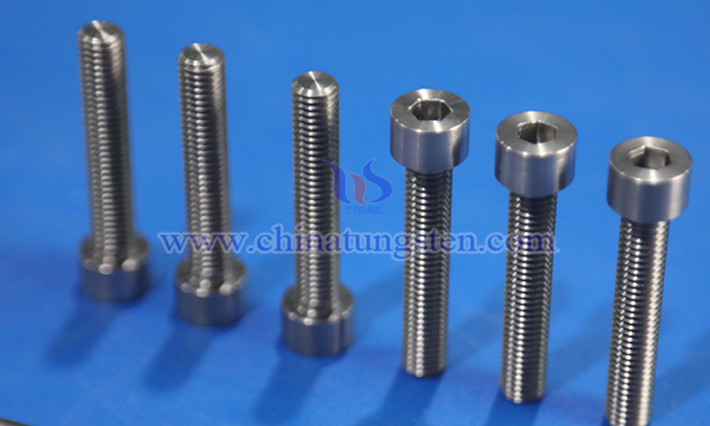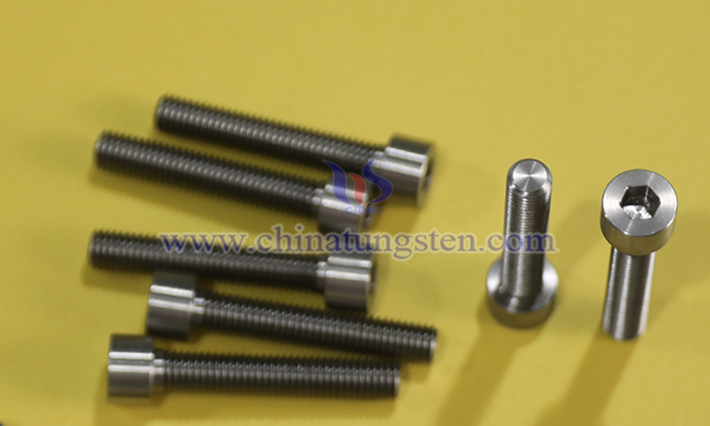Performance Comparison of Tungsten Alloy Screws and Stainless Steel Screws
- Details
- Category: Tungsten Information
- Published on Thursday, 25 September 2025 14:47
Tungsten alloy screws and stainless steel screws are two common screw materials, with the former renowned for its high hardness and high-temperature resistance, and the latter distinguished by its cost-effectiveness and versatility. The following text primarily discusses their performance comparison.

Heat Resistance: Tungsten alloy screws benefit from their high melting point and excellent thermal stability, maintaining structural integrity under high-temperature conditions. Through alloying optimization, they effectively resist thermal stress shocks, avoiding softening or deformation, making them suitable for applications such as aviation engine combustion chambers, connections of components inside industrial high-temperature furnaces, and fastening critical parts in nuclear reactors. In contrast, stainless steel screws have relatively limited high-temperature resistance. While standard stainless steel can maintain performance at moderate temperatures, even high-grade stainless steel tends to experience strength reduction or surface oxidation in sustained high-temperature or thermal cycling environments, leading to connection failure and making them unsuitable for demanding high-temperature scenarios.
Mechanical Performance: Tungsten alloy screws excel in mechanical performance with high hardness and tensile strength, capable of withstanding high torque and intense vibration. Their threads offer strong wear resistance, resisting wear or loosening over long-term use, making them an ideal choice for precision instrument core components, aerospace structural connections, and high-stress node fixation in heavy machinery. Stainless steel screws, however, feature balanced strength and toughness suited for standard conditions, such as fixing construction steel components or non-critical automotive parts. However, their lower hardness makes threads prone to fatigue damage or wear in high-friction or dynamic high-load environments, resulting in lower long-term reliability compared to tungsten alloy screws.

Chemical Stability: Tungsten alloy screws resist corrosion from strong acids, strong alkalis, and oxidizing gases, making them suitable for connections in vacuum coating equipment chambers, flange fixations in high-temperature reactors, and component connections in highly corrosive marine engineering environments, ensuring long-term performance stability and extending equipment lifespan. Stainless steel screws offer corrosion resistance primarily for everyday scenarios, with their surface passivation film effectively preventing rust in humid environments or mild salt spray, meeting the needs of building facades or household equipment. However, in strong acid, strong alkali, or high-temperature oxidation environments, their passivation film is prone to failure, leading to pitting or accelerated corrosion, requiring additional protective measures to handle moderate corrosive conditions.
Weight and Processability: Due to their high density, tungsten alloy screws are heavier, which can serve dual purposes of fastening and balancing in scenarios requiring counterweights. Their high hardness and brittleness necessitate complex processes like precision casting or high-temperature sintering, resulting in higher costs and longer production cycles. Stainless steel screws, with their moderate density and lightweight properties, are well-suited for lightweight design needs; their excellent cutting and forming capabilities are compatible with conventional processing equipment, enabling low-cost, large-scale production, making them the preferred material for general applications.
- Chinatungsten Online: www.tungsten-alloy.com
- CTIA GROUP LTD: en.ctia.group
- Tungsten News & Price: www.ctia.com.cn
- Molybdenum News & Price: news.molybdenum.com.cn
- Tel.: 86 592 5129696; Email: sales@chinatungsten.com



 sales@chinatungsten.com
sales@chinatungsten.com